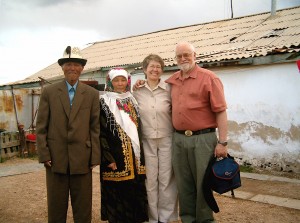Another from my Deleted Scenes folder. This time, the story of an afternoon visiting the family of one of my top students, Gulsaira. Here’s Woody and me with her parents.

- Woody and me with Gulsaira’s parents after a lovely meal.
A young woman from my English 30 group, Gulsaira, invited Woody and me to her home one Sunday afternoon where we had a lovely visit with her family over a platter of bishparmak, the national dish.
Her mother was gracious but shy and I did not learn much about her. But I learned that her father, 72, was still tending sheep each day with his 45-year-old horse; and her brother had recently returned from a trip through South America, part of a troupe that brought the story of Kazakh nomads to life all around the world, complete with a caravan of camels and multiple yurts. How I wished I spoke the Kazakh language.
Gulsaira’s village sat behind the railway station. Her mother and a few other women were busy in the kitchen near the back door when Woody and I arrived. I handed her mother the requisite box of chocolates that Peace Corps advised us to always bring. She took it with a smile but didn’t say a word.
Gulsaira ushered us through the small house into the living room where a long, low table was set. The traditional dastarkhan tabletop had become familiar to me. The dishes may have varied in color and pattern, but they were still salad plate size, one per seat, with all the familiar salads arrayed, each to be tossed with the requisite mayonnaise just before serving. The salads were always the same, no matter whose home we were in. But as with most things, the more familiar they became, the more I liked them.

Also familiar was the family photo album offered for perusing before the meal was served. This time, we had brought our own collection of photos from home and I enjoyed watching Gulsaira’s mother take particular glee in the photos of my grandchildren. Then Gulsaira’s brother offered us photos of his many camel caravans to other countries.
“He will be in Germany this summer,” Gulsaira told us. “And they want to go to America in 2007.” I wanted to know more of this caravan.
“Who pays for it? Who sets the schedule? ” I asked. “How do you move a caravan of camels from Central Asia to any of the many starting points?” She did not know and though she asked her brother, I was unable to grasp the answers.
And again, I so appreciated how comfortable I was becoming with “not knowing.”

On another occasion, Gulsaira was the only one of my students in English 30 who completed one of my assignments.
Eager to understand the history of their country, I’d capitalized on the pride my students felt in their new, young country. I assigned a “home task” (no one called it “homework”) for them.
“I want to know what was happening in your country in or around the years 1492 and 1776.” I gave them the weekend to prepare.
“It was the time of the Kazakh Khanate,” Gulsaira announced proudly when I asked about 1492. I needed her to explain. “We came together to be one country.” Close enough.
According to a British travel book, Kazakhstan, the Kazakh Khanate was first proclaimed sometime between 1465 and 1467, “laying the foundation for the first Kazakh state.” Other sources generally list “late 15th century.”
For 1776, my US year of independence, Gulsaira explained it was a time when “the Russians came.” That meant, I knew, the end of their independence for the next two hundred years.
###
What other cultures are you most interested in? How do you learn about this culture? How might you compare these two cultures?


Kathleen Pooler
Janet, This is wonderful. I had never even heard of Kazakh until I met you! I am fascinated by your stories and enticed to know more. This personal view makes me feel like I was right there with you. The photos are delightful. I feel so enlightened 🙂 Thank you for sharing.
Kathy
Janet
Hi Kathy, So glad you stopped by. And particularly pleased that you are enjoying my stories of Kazakhstan and Kazakh life. I think I’m beginning to find my niche.
gulzhahan
Hi,
I wish Gulzaira read this part of the book. I think she will be very glad to read this story. We should find her.
Janet
Hi Gulzhahan
I would love to hear from h
Gulsaira again. Just last week, I was “talking” to both Yestai and Gulsana at the same time AND it was my cell phone in a small cafe in New York State where my mom and I had stopped for lunch on our way home from Ohio. I was thrilled. I’m starting to like technology.